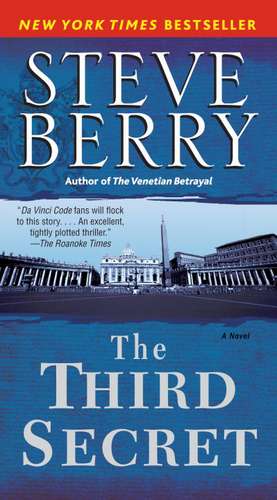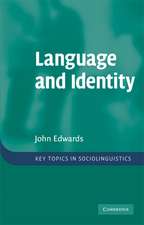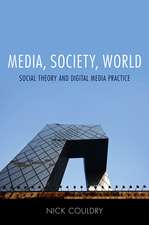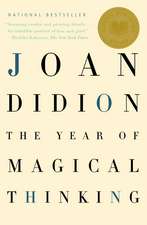The Third Secret
Autor Steve Berryen Limba Engleză Paperback – 31 oct 2007
Fatima, Portugal, 1917: The Virgin Mary appears to three peasant children, sharing with them three secrets, two of which are soon revealed to the world. The third secret is sealed away in the Vatican, read only by popes, and not disclosed until the year 2000. When revealed, its quizzical tone and anticlimactic nature leave many faithful wondering if the Church has truly unveiled all of the Virgin Mary’s words–or if a message far more important has been left in the shadows.
Vatican City, present day: Papal secretary Father Colin Michener is concerned for the Pope. Night after restless night, Pope Clement XV enters the Vatican’s Riserva, the special archive open only to popes, where the Church’s most clandestine and controversial documents are stored. Though unsure of the details, Michener knows that the Pope’s distress stems from the revelations of Fatima.
Equally concerned, but not out of any sense of compassion, is Alberto Cardinal Valendrea, the Vatican’s Secretary of State,. Valendrea desperately covets the papacy, having narrowly lost out to Clement at the last conclave. Now the Pope’s interest in Fatima threatens to uncover a shocking ancient truth that Valendrea has kept to himself for many years.
When Pope Clement sends Michener to the Romanian highlands, then to a Bosnian holy site, in search of a priest–possibly one of the last people on Earth who knows Mary’s true message–a perilous set of events unfolds. Michener finds himself embroiled in murder, suspicion, suicide, deceit, and his forbidden passion for a beloved woman. In a desperate search for answers, he travels to Pope Clement’s birthplace in Germany, where he learns that the third secret of Fatima may dictate the very fate of the Church–a fate now lying in Michener’s own hands.
| Toate formatele și edițiile | Preț | Express |
|---|---|---|
| Paperback (2) | 48.48 lei 3-5 săpt. | +24.35 lei 6-12 zile |
| Hodder & Stoughton – 8 mai 2006 | 48.48 lei 3-5 săpt. | +24.35 lei 6-12 zile |
| BALLANTINE BOOKS – 31 oct 2007 | 62.51 lei 3-5 săpt. |
Preț: 62.51 lei
Nou
Puncte Express: 94
Preț estimativ în valută:
11.96€ • 12.79$ • 9.97£
11.96€ • 12.79$ • 9.97£
Carte disponibilă
Livrare economică 27 martie-10 aprilie
Preluare comenzi: 021 569.72.76
Specificații
ISBN-13: 9780345504401
ISBN-10: 0345504402
Pagini: 449
Dimensiuni: 108 x 192 x 29 mm
Greutate: 0.26 kg
Editura: BALLANTINE BOOKS
ISBN-10: 0345504402
Pagini: 449
Dimensiuni: 108 x 192 x 29 mm
Greutate: 0.26 kg
Editura: BALLANTINE BOOKS
Extras
Vatican City
Wednesday, November 8th, The Present
6:15 a.m.
Monsignor Colin Michener heard the sound again and closed the book. Somebody was there. He knew it.
Like before.
He stood from the reading desk and stared around at the array of baroque shelves. The ancient bookcases towered above him and more stood at attention down narrow halls that spanned in both directions. The cavernous room carried an aura, a mystique bred in part by its label. L’ Archivio Segreto Vaticano. The Secret Archives of the Vatican.
He’d always thought that name strange since little contained within the volumes was secret. Most were merely the meticulous record of two millennia of Church organization, the accounts from a time when popes were kings, warriors, politicians, and lovers. All told there were twenty-five miles of shelves which offered much if a searcher knew where to look.
And Michener certainly did.
Re-focusing on the sound, his gaze drifted across the room, past frescos of Constantine, Pepin, and Frederick II, before settling on an iron grille at the far side. The space beyond the grille was dark and quiet. The Riserva was accessed only by direct papal authority, the key to the grille held by the Church’s archivist. Michener had never entered that chamber, though he’d stood dutifully outside while his boss, Pope Clement XV, ventured inside. Even so, he was aware of some of the precious documents that windowless space contained. The last letter of Mary, Queen of Scots, before she was beheaded by Elizabeth I. The petitions of seventy-five English lords asking the pope to annul Henry VIII’s first marriage. Galileo’s signed confession. Napoleon’s Treaty of Tolentino.
He studied the cresting and buttresses of the iron grille, a gilded frieze of foliage and animals hammered into the metal above. The gate itself had stood since the fourteenth century. Nothing in Vatican City was ordinary. Everything carried the distinctive mark of a renowned artist or a legendary craftsman, someone who’d labored for years trying to please both his God and his pope.
He strode across the room, his footfalls echoing through the tepid air, and stopped at the iron gate. A warm breeze swept past him from beyond the grille. The right side of the portal was dominated by a huge hasp. He tested the bolt. Locked and secure.
He turned back, wondering if one of the staff had entered the archives. The duty scriptor had departed when he’d arrived earlier and no one else would be allowed inside while he was there, since the papal secretary needed no babysitter. But there were a multitude of doors that led in and out, and he wondered if the noise he’d heard moments ago was that of ancient hinges being worked open, then gently closed. It was hard to tell. Sound within the great expanse was as confused as the writings.
He stepped to his right, toward one of the long corridors–the Hall of Parchments. Beyond was the Room of Inventories and Indexes. As he walked, overhead bulbs flashed on and off, casting a succession of light pools, and he felt as if he was underground, though he was two stories up.
He ventured only a little way, heard nothing, then turned around.
It was early in the day and mid-week. He’d chosen this time for his research deliberately–less chance of impeding others who’d gained access to the archives, and less chance of attracting the attention of Curial employees. He was on a mission for the Holy Father, his inquiries private, but he was not alone. The last time, a week ago, he’d sensed the same thing.
He re-entered the main hall and stepped back to the reading desk, his attention still on the room. The floor was a zodiacal diagram oriented to the sun, its rays able to penetrate thanks to carefully positioned slits high in the walls. He knew that centuries ago the Gregorian calendar had been calculated at this precise spot. Yet no sunlight leaked in today. Outside was cold and wet, a mid-autumn rainstorm pelting Rome.
The volumes that had held his attention for the past two hours were neatly arranged on the lectern. Many had been composed within the past two decades. Four were much older. Two of the oldest were written in Italian, one was in Spanish, the other in Portuguese. He could read all of them with ease–another reason Clement XV coveted his employment.
The Spanish and Italian accounts were of little value, both re-hashes of the Portuguese work: A Comprehensive and Detailed Study of the Reported Apparitions of the Holy Virgin Mary at Fatima—May 13, 1917 to October 13, 1917.
Pope Benedict XV had ordered the investigation in 1922 as part of the Church’s investigation into what supposedly had occurred in a remote Portuguese valley. The entire manuscript was handwritten, the ink faded to a warm yellow so the words appeared as if they were scripted in gold. The Bishop of Leira had performed a thorough inquiry, spending eight years in all, and the information later became critical in the 1930 acknowledgment by the Vatican that the Virgin’s six earthly appearances at Fatima were worthy of assent. Three appendices, now attached to the original, were generated in the 1950s, 60s, and 90s.
Michener had studied them all with the thoroughness of the lawyer he’d been trained by the Church to be. Seven years at the University of Munich had earned him his degrees, yet he’d never practiced law conventionally. His was a world of ecclesiastical pronouncements and canonical decrees. Precedent spanned two millennia and relied more on an understanding of the times than on any notion of stare decisis. His arduous legal training had become invaluable to his Church service, as the logic of the law had many times become an ally in the confusing mire of divine politics. More importantly, it had just helped him find in this labyrinth of forgotten information what Clement XV wanted.
The sound came again.
A soft squeak, like two limbs rubbing together in a breeze, or a mouse announcing its presence.
He rushed toward the source and glanced both ways.
Nothing.
Fifty feet off to the left, a door led out of the archive. He approached the portal and tested the lock. It yielded. He strained to open the heavy slab of carved oak and the iron hinges squealed ever so slightly.
A sound he recognized.
The hallway beyond was empty, but a gleam on the marble floor caught his attention.
He knelt.
The transparent clumps of moisture came with regularity, the droplets leading off into the corridor, then back through the doorway into the archive. Suspended within some were remnants of mud, leaves, and grass.
He followed the trail with his gaze which stopped at the end of a row of shelves. Rain continued to pound the roof.
He knew the puddles for what they were.
Footprints.
Wednesday, November 8th, The Present
6:15 a.m.
Monsignor Colin Michener heard the sound again and closed the book. Somebody was there. He knew it.
Like before.
He stood from the reading desk and stared around at the array of baroque shelves. The ancient bookcases towered above him and more stood at attention down narrow halls that spanned in both directions. The cavernous room carried an aura, a mystique bred in part by its label. L’ Archivio Segreto Vaticano. The Secret Archives of the Vatican.
He’d always thought that name strange since little contained within the volumes was secret. Most were merely the meticulous record of two millennia of Church organization, the accounts from a time when popes were kings, warriors, politicians, and lovers. All told there were twenty-five miles of shelves which offered much if a searcher knew where to look.
And Michener certainly did.
Re-focusing on the sound, his gaze drifted across the room, past frescos of Constantine, Pepin, and Frederick II, before settling on an iron grille at the far side. The space beyond the grille was dark and quiet. The Riserva was accessed only by direct papal authority, the key to the grille held by the Church’s archivist. Michener had never entered that chamber, though he’d stood dutifully outside while his boss, Pope Clement XV, ventured inside. Even so, he was aware of some of the precious documents that windowless space contained. The last letter of Mary, Queen of Scots, before she was beheaded by Elizabeth I. The petitions of seventy-five English lords asking the pope to annul Henry VIII’s first marriage. Galileo’s signed confession. Napoleon’s Treaty of Tolentino.
He studied the cresting and buttresses of the iron grille, a gilded frieze of foliage and animals hammered into the metal above. The gate itself had stood since the fourteenth century. Nothing in Vatican City was ordinary. Everything carried the distinctive mark of a renowned artist or a legendary craftsman, someone who’d labored for years trying to please both his God and his pope.
He strode across the room, his footfalls echoing through the tepid air, and stopped at the iron gate. A warm breeze swept past him from beyond the grille. The right side of the portal was dominated by a huge hasp. He tested the bolt. Locked and secure.
He turned back, wondering if one of the staff had entered the archives. The duty scriptor had departed when he’d arrived earlier and no one else would be allowed inside while he was there, since the papal secretary needed no babysitter. But there were a multitude of doors that led in and out, and he wondered if the noise he’d heard moments ago was that of ancient hinges being worked open, then gently closed. It was hard to tell. Sound within the great expanse was as confused as the writings.
He stepped to his right, toward one of the long corridors–the Hall of Parchments. Beyond was the Room of Inventories and Indexes. As he walked, overhead bulbs flashed on and off, casting a succession of light pools, and he felt as if he was underground, though he was two stories up.
He ventured only a little way, heard nothing, then turned around.
It was early in the day and mid-week. He’d chosen this time for his research deliberately–less chance of impeding others who’d gained access to the archives, and less chance of attracting the attention of Curial employees. He was on a mission for the Holy Father, his inquiries private, but he was not alone. The last time, a week ago, he’d sensed the same thing.
He re-entered the main hall and stepped back to the reading desk, his attention still on the room. The floor was a zodiacal diagram oriented to the sun, its rays able to penetrate thanks to carefully positioned slits high in the walls. He knew that centuries ago the Gregorian calendar had been calculated at this precise spot. Yet no sunlight leaked in today. Outside was cold and wet, a mid-autumn rainstorm pelting Rome.
The volumes that had held his attention for the past two hours were neatly arranged on the lectern. Many had been composed within the past two decades. Four were much older. Two of the oldest were written in Italian, one was in Spanish, the other in Portuguese. He could read all of them with ease–another reason Clement XV coveted his employment.
The Spanish and Italian accounts were of little value, both re-hashes of the Portuguese work: A Comprehensive and Detailed Study of the Reported Apparitions of the Holy Virgin Mary at Fatima—May 13, 1917 to October 13, 1917.
Pope Benedict XV had ordered the investigation in 1922 as part of the Church’s investigation into what supposedly had occurred in a remote Portuguese valley. The entire manuscript was handwritten, the ink faded to a warm yellow so the words appeared as if they were scripted in gold. The Bishop of Leira had performed a thorough inquiry, spending eight years in all, and the information later became critical in the 1930 acknowledgment by the Vatican that the Virgin’s six earthly appearances at Fatima were worthy of assent. Three appendices, now attached to the original, were generated in the 1950s, 60s, and 90s.
Michener had studied them all with the thoroughness of the lawyer he’d been trained by the Church to be. Seven years at the University of Munich had earned him his degrees, yet he’d never practiced law conventionally. His was a world of ecclesiastical pronouncements and canonical decrees. Precedent spanned two millennia and relied more on an understanding of the times than on any notion of stare decisis. His arduous legal training had become invaluable to his Church service, as the logic of the law had many times become an ally in the confusing mire of divine politics. More importantly, it had just helped him find in this labyrinth of forgotten information what Clement XV wanted.
The sound came again.
A soft squeak, like two limbs rubbing together in a breeze, or a mouse announcing its presence.
He rushed toward the source and glanced both ways.
Nothing.
Fifty feet off to the left, a door led out of the archive. He approached the portal and tested the lock. It yielded. He strained to open the heavy slab of carved oak and the iron hinges squealed ever so slightly.
A sound he recognized.
The hallway beyond was empty, but a gleam on the marble floor caught his attention.
He knelt.
The transparent clumps of moisture came with regularity, the droplets leading off into the corridor, then back through the doorway into the archive. Suspended within some were remnants of mud, leaves, and grass.
He followed the trail with his gaze which stopped at the end of a row of shelves. Rain continued to pound the roof.
He knew the puddles for what they were.
Footprints.
Recenzii
Praise for Steve Berry
The Third Secret
“Controversial, shocking, explosive . . . rich in a wealth of Vatican insider knowledge and two thousand years of Virgin Mary visitations. The Third Secret will change our view of the relation between religion and wisdom.”
–KATHERINE NEVILLE, author of The Eight
The Romanov Prophecy
“Perfect for thriller fans and history buffs alike. Fabulous plot twists.”
–DAVID MORRELL, author of The Protector
“Compelling . . . adventure-filled . . . a fast-moving, globe-hopping tale of long-lost treasure and shadowy bad guys.”
–San Francisco Chronicle
The Amber Room
“Sexy, illuminating . . . my kind of thriller.”
–DAN BROWN, author of The Da Vinci Code
“Magnificently engrossing, with wonderful characters and a plot that speeds, twists, and turns. Pure intrigue, pure fun.”
–CLIVE CUSSLER, author of Sacred Stone
The Third Secret
“Controversial, shocking, explosive . . . rich in a wealth of Vatican insider knowledge and two thousand years of Virgin Mary visitations. The Third Secret will change our view of the relation between religion and wisdom.”
–KATHERINE NEVILLE, author of The Eight
The Romanov Prophecy
“Perfect for thriller fans and history buffs alike. Fabulous plot twists.”
–DAVID MORRELL, author of The Protector
“Compelling . . . adventure-filled . . . a fast-moving, globe-hopping tale of long-lost treasure and shadowy bad guys.”
–San Francisco Chronicle
The Amber Room
“Sexy, illuminating . . . my kind of thriller.”
–DAN BROWN, author of The Da Vinci Code
“Magnificently engrossing, with wonderful characters and a plot that speeds, twists, and turns. Pure intrigue, pure fun.”
–CLIVE CUSSLER, author of Sacred Stone
Notă biografică
Steve Berry is the New York Times and #1 internationally bestselling author of The King’s Deception, The Columbus Affair, The Jefferson Key, The Emperor’s Tomb, The Paris Vendetta, The Charlemagne Pursuit, The Venetian Betrayal, The Alexandria Link, The Templar Legacy, The Third Secret, The Romanov Prophecy, and The Amber Room. His books have been translated into 40 languages with more than 15,000,000 printed copies in 51 countries.
History lies at the heart of every Steve Berry novel. It’s this passion, one he shares with his wife, Elizabeth, that led them to create History Matters, a foundation dedicated to historic preservation. Since 2009 Steve and Elizabeth have traveled across the country to save endangered historic treasures, raising money via lectures, receptions, galas, luncheons, dinners, and their popular writers’ workshops. To date, nearly 2,000 students have attended those workshops. In 2012 their work was recognized by the American Library Association, which named Steve the first spokesman for National Preservation Week. He was also appointed by the Smithsonian Board of Regents to serve on the Smithsonian Libraries Advisory Board to help promote and support the libraries in their mission to provide information in all forms to scientists, curators, scholars, students and the public at large. He has received the Royden B. Davis Distinguished Author Award and the 2013 Writers for Writers Award from Poets & Writers. His novel The Columbus Affair earned him the Anne Frank Human Writes Award, and his historic preservation work merited the 2013 Silver Bullet from International Thriller Writers.
Steve Berry was born and raised in Georgia, graduating from the Walter F. George School of Law at Mercer University. He was a trial lawyer for 30 years and held elective office for 14 of those years. He is a founding member of International Thriller Writers—a group of more than 2,000 thriller writers from around the world—and served three years as its co-president.
For more information, visit www.steveberry.org.
From the Hardcover edition.
History lies at the heart of every Steve Berry novel. It’s this passion, one he shares with his wife, Elizabeth, that led them to create History Matters, a foundation dedicated to historic preservation. Since 2009 Steve and Elizabeth have traveled across the country to save endangered historic treasures, raising money via lectures, receptions, galas, luncheons, dinners, and their popular writers’ workshops. To date, nearly 2,000 students have attended those workshops. In 2012 their work was recognized by the American Library Association, which named Steve the first spokesman for National Preservation Week. He was also appointed by the Smithsonian Board of Regents to serve on the Smithsonian Libraries Advisory Board to help promote and support the libraries in their mission to provide information in all forms to scientists, curators, scholars, students and the public at large. He has received the Royden B. Davis Distinguished Author Award and the 2013 Writers for Writers Award from Poets & Writers. His novel The Columbus Affair earned him the Anne Frank Human Writes Award, and his historic preservation work merited the 2013 Silver Bullet from International Thriller Writers.
Steve Berry was born and raised in Georgia, graduating from the Walter F. George School of Law at Mercer University. He was a trial lawyer for 30 years and held elective office for 14 of those years. He is a founding member of International Thriller Writers—a group of more than 2,000 thriller writers from around the world—and served three years as its co-president.
For more information, visit www.steveberry.org.
From the Hardcover edition.
Descriere
Explosive in both its pace and its revelations, "The Third Secret" is a remarkable international thriller. Bestselling author Berry tackles some of the most controversial ideas of our time in a breakneck journey through the history of the Church and the future of religion.



















